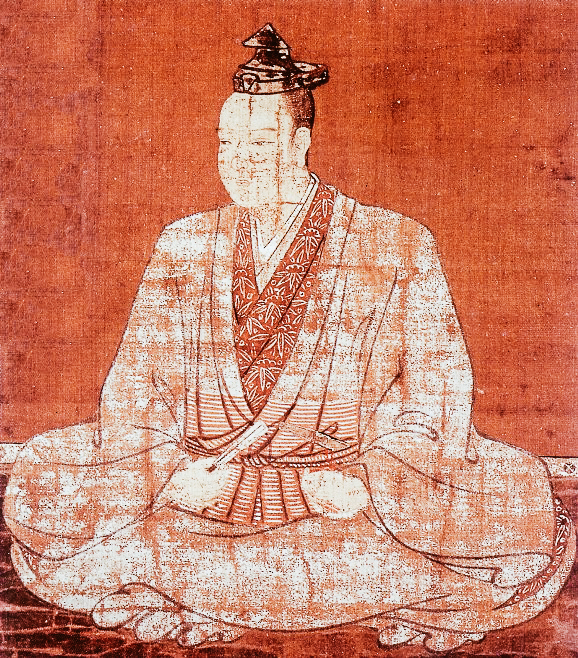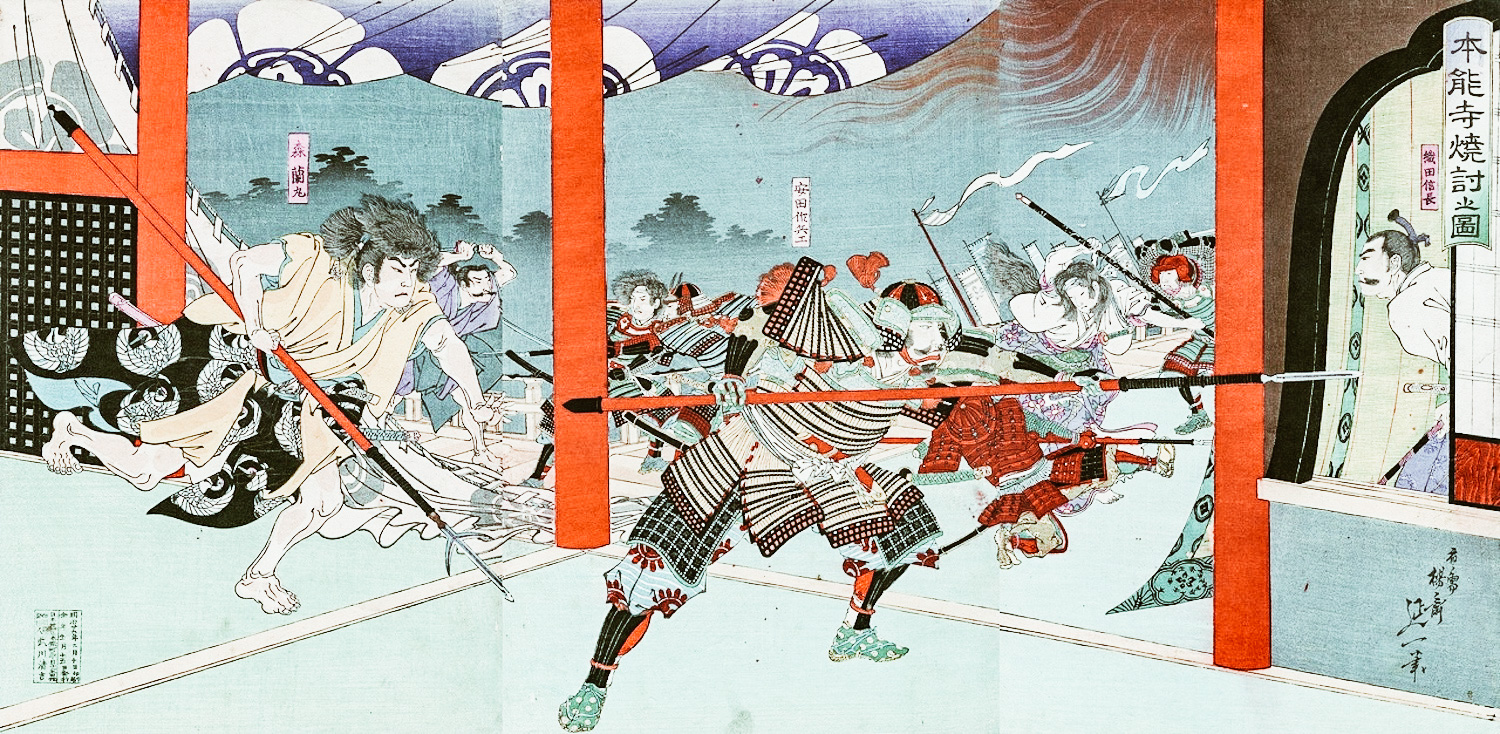Japan History: Akechi Mitsuhide
Akechi Mitsuhide (1526 – luglio 1582), noto anche come Koreta Mitsuhide, è stato un generale giapponese. Figlio di Akechi Mitsukuni, Mitsuhide servì Asakura Yoshikage e nel 1566 divenne messaggero per il “vagabondo errante” Ashikaga Yoshiaki. Tuttavia, la sua fama maggiore fu quella di essere uno dei generali al servizio del daimyō Oda Nobunaga, e il suo tradimento ne causò la morte.

photo credits: samurai-world.com
Cominciò a servire Oda Nobunaga nel 1566 dopo la conquista della provincia di Mino e nel 1571, dimostrandosi un abile generale, ricevette in feudo il territorio di Sakamoto. Oda Nobunaga, vedendolo come uno degli uomini di cui poteva fidarsi maggiormente, lo incaricò di pacificare la regione di Tamba e porla sotto al controllo del suo signore. Le sue campagne militari contro i clan locali ebbero successo e una volta conquistato il territorio, venne ricompensato con il castello di Kamiyama diventando il governatore della provincia di Hyūga.
Il tradimento
Nel 1579 Mitsuhide conquistò il castello di Yakami che apparteneva a Hatano Hideharu e negoziò con lui i termini per la pacificazione. Oda Nobunaga, in totale disaccordo con gli accordi presi dal suo vassallo, fece giustiziare Hideharu. A quel punto il clan Hatano si vendicò nei confronti di Akechi Mitsuhide uccidendone la madre che era stata inviata come ostaggio durante le trattative. Probabilmente questo fu uno dei motivi che portarono Mitsuhide a tradire Oda Nobunaga.

photo credits: samurai-world.com
Il 21 giugno 1582 Nobunaga, nel tentativo di sfuggire al colpo di stato organizzato da Mitsuhide, si rifugiò nell’Honnō-ji, un tempio di Kyoto che Mitsuhide incendiò. A quel punto non si sa se Nobunaga morì nell’incendio o se fece in tempo a compiere seppuku prima. Tuttavia, alla notizia della sua morte, Toyotomi Hideyoshi e Tokugawa Ieyasu radunarono i propri eserciti per inseguire Mitsuhide. Hideyoshi fu il primo a trovarlo e lo sconfisse nella battaglia di Yamazaki durante la quale il traditore di Nobunaga fu ucciso da un bandito chiamato Nakamura. A causa della sua morte venne soprannominato Jūsan-kobū (Shōgun dei tredici giorni).
I motivi del tradimento

photo credits: samurai-world.com
Non si sanno tutti i motivi che spinsero Mitsuhide a tradire Nobunaga, uno potrebbe essere quello che abbiamo già detto che coinvolgeva l’assassinio di sua madre. Un altro potrebbe riguardare invece l’amicizia che legava Akechi Mitsuhide con Chosokabe Motochika, daimyo di Shikoku. Intorno al 2013, alcuni ricercatori hanno scoperto una serie di lettere nel Museo di Okayama tra Akechi Mitsuhide e il suo amico di vecchia data, Chosokabe Motochika. Le lettere erano state scritte pochi mesi prima dell’attacco del 21 maggio 1582 all’Honno-ji. Secondo le lettere, Chosokabe aveva deciso di non opporsi a Nobunaga ed era disposto a sottomettersi al signore della guerra. In risposta, sembra che Mitsuhide stesse cercando di evitare di prendere parte alla sottomissione di Shikoku per evitare una futura disputa che avrebbe potuto coinvolgere Chosokabe. Proprio per proteggere il suo amico, Akechi Mitsuhide decise probabilmente di tradire Nobunaga.
Un’altra probabile ragione fu la conoscenza di Mitsuhide dei piani futuri di Nobunaga che desiderava governare la nazione. Nobunaga aveva dichiarato di voler diventare Tenka Fubu, l’unico sovrano sotto il cielo. Per questo, si ipotizzò che volesse rovesciare l’imperatore, per fare in modo che sopra di lui non ci fosse nessuno. Forse Akechi Mitsuhide decise di eliminare Nobunaga salvando così la famiglia imperiale e l’imperatore.
Secondo alcune fonti riuscì a salvarsi nella battaglia di Yamazaki diventando un monaco di nome Nankobo Tenkai. La sua vita è completamente immersa nel mistero e continua, ancora oggi, a suscitare dubbi e creare supposizioni.[:en]Akechi Mitsuhide (1526 – July 1582), also known as Koreta Mitsuhide, was a Japanese general. Son of Akechi Mitsukuni, Mitsuhide served Asakura Yoshikage and in 1566 he became a messenger for the “wandering wanderer” Ashikaga Yoshiaki. However, his greatest fame was that of being one of the generals in the service of the daimyō Oda Nobunaga, and his betrayal caused his death.

photo credits: samurai-world.com
He began to serve Oda Nobunaga in 1566 after the conquest of the province of Mino and in 1571, proving himself as skilled general, he received the territory of Sakamoto as a fief. Oda Nobunaga, seeing him as one of the men he could trust most, commissioned him to pacify the Tamba region and place it under the control of his lord. His military campaigns against local clans were successful and once he conquered the territory, he was rewarded with Kamiyama Castle by becoming the governor of Hyūga province.
Betrayal
In 1579 Mitsuhide conquered Yakami Castle which belonged to Hatano Hideharu and negotiated with him the terms for pacification. Oda Nobunaga, in total disagreement with the agreements made by his vassal, had Hideharu executed. At that point, the Hatano clan retaliated against Akechi Mitsuhide by killing his mother who had been kept hostage during the negotiations. This was probably one of the reasons that led Mitsuhide to betray Oda Nobunaga.

photo credits: samurai-world.com
On June 21, 1582, Nobunaga, in an attempt to escape the coup d’état organized by Mitsuhide, took refuge in the Honnō-Ji, a Kyoto temple that Mitsuhide burned. At that point, it is not known if Nobunaga died in the fire or if he had time to make seppuku first, but at the news of his death, Toyotomi Hideyoshi and Tokugawa Ieyasu gathered their armies to chase Mitsuhide. Hideyoshi was the first to find him and defeated him in the battle of Yamazaki during which Nobunaga’s traitor was killed by a bandit called Nakamura. Due to his death, he was nicknamed Jūsan-kobū (thirteen-day Shōgun).
The reasons for the betrayal

photo credits: samurai-world.com
We don’t know all the reasons that led Mitsuhide to betray Nobunaga, one could be what we have already said involving the murder of his mother. Another could concern the friendship that tied Akechi Mitsuhide with Shikoku daimyo Chosokabe Motochika. Around 2013, researchers discovered a series of letters in the Okayama Museum between Akechi Mitsuhide and his longtime friend, Chosokabe Motochika. The letters had been written a few months before the May 21, 1582 attack on Honno-Ji. According to the letters, Chosokabe had decided not to oppose Nobunaga and was willing to submit to the warlord. In response, it appears that Mitsuhide was trying to avoid taking part in Shikoku’s submission to avoid a future dispute that could have involved Chosokabe. Just to protect his friend, Akechi Mitsuhide probably decided to betray Nobunaga.
Another probable reason was Mitsuhide’s knowledge of Nobunaga’s future plans that he wished to rule the nation. Nobunaga had said he wanted to become Tenka Fubu, the only ruler under the sky. For this reason, it was assumed that he wanted to overthrow the emperor so that there would be no one above him. Perhaps Akechi Mitsuhide decided to eliminate Nobunaga thus saving the imperial family and the emperor.
According to some sources he managed to save himself in the battle of Yamazaki by becoming a monk named Nankobo Tenkai. His life is completely immersed in mystery and continues, even today, to arouse doubts and create assumptions.[:ja]Akechi Mitsuhide (1526 – July 1582), also known as Koreta Mitsuhide, was a Japanese general. Son of Akechi Mitsukuni, Mitsuhide served Asakura Yoshikage and in 1566 he became a messenger for the “wandering wanderer” Ashikaga Yoshiaki. However, his greatest fame was that of being one of the generals in the service of the daimyō Oda Nobunaga, and his betrayal caused his death.

photo credits: samurai-world.com
He began to serve Oda Nobunaga in 1566 after the conquest of the province of Mino and in 1571, proving himself as skilled general, he received the territory of Sakamoto as a fief. Oda Nobunaga, seeing him as one of the men he could trust most, commissioned him to pacify the Tamba region and place it under the control of his lord. His military campaigns against local clans were successful and once he conquered the territory, he was rewarded with Kamiyama Castle by becoming the governor of Hyūga province.
Betrayal
In 1579 Mitsuhide conquered Yakami Castle which belonged to Hatano Hideharu and negotiated with him the terms for pacification. Oda Nobunaga, in total disagreement with the agreements made by his vassal, had Hideharu executed. At that point, the Hatano clan retaliated against Akechi Mitsuhide by killing his mother who had been kept hostage during the negotiations. This was probably one of the reasons that led Mitsuhide to betray Oda Nobunaga.

photo credits: samurai-world.com
On June 21, 1582, Nobunaga, in an attempt to escape the coup d’état organized by Mitsuhide, took refuge in the Honnō-Ji, a Kyoto temple that Mitsuhide burned. At that point, it is not known if Nobunaga died in the fire or if he had time to make seppuku first, but at the news of his death, Toyotomi Hideyoshi and Tokugawa Ieyasu gathered their armies to chase Mitsuhide. Hideyoshi was the first to find him and defeated him in the battle of Yamazaki during which Nobunaga’s traitor was killed by a bandit called Nakamura. Due to his death, he was nicknamed Jūsan-kobū (thirteen-day Shōgun).
The reasons for the betrayal

photo credits: samurai-world.com
We don’t know all the reasons that led Mitsuhide to betray Nobunaga, one could be what we have already said involving the murder of his mother. Another could concern the friendship that tied Akechi Mitsuhide with Shikoku daimyo Chosokabe Motochika. Around 2013, researchers discovered a series of letters in the Okayama Museum between Akechi Mitsuhide and his longtime friend, Chosokabe Motochika. The letters had been written a few months before the May 21, 1582 attack on Honno-Ji. According to the letters, Chosokabe had decided not to oppose Nobunaga and was willing to submit to the warlord. In response, it appears that Mitsuhide was trying to avoid taking part in Shikoku’s submission to avoid a future dispute that could have involved Chosokabe. Just to protect his friend, Akechi Mitsuhide probably decided to betray Nobunaga.
Another probable reason was Mitsuhide’s knowledge of Nobunaga’s future plans that he wished to rule the nation. Nobunaga had said he wanted to become Tenka Fubu, the only ruler under the sky. For this reason, it was assumed that he wanted to overthrow the emperor so that there would be no one above him. Perhaps Akechi Mitsuhide decided to eliminate Nobunaga thus saving the imperial family and the emperor.
According to some sources he managed to save himself in the battle of Yamazaki by becoming a monk named Nankobo Tenkai. His life is completely immersed in mystery and continues, even today, to arouse doubts and create assumptions.[:]
Condividi:
- Fai clic per condividere su Facebook (Si apre in una nuova finestra)
- Fai clic qui per condividere su Twitter (Si apre in una nuova finestra)
- Fai clic qui per condividere su Tumblr (Si apre in una nuova finestra)
- Fai clic qui per condividere su Pinterest (Si apre in una nuova finestra)
- Fai clic per condividere su Telegram (Si apre in una nuova finestra)
- Fai clic per condividere su WhatsApp (Si apre in una nuova finestra)
- Fai clic qui per condividere su Reddit (Si apre in una nuova finestra)
- Fai clic qui per stampare (Si apre in una nuova finestra)






